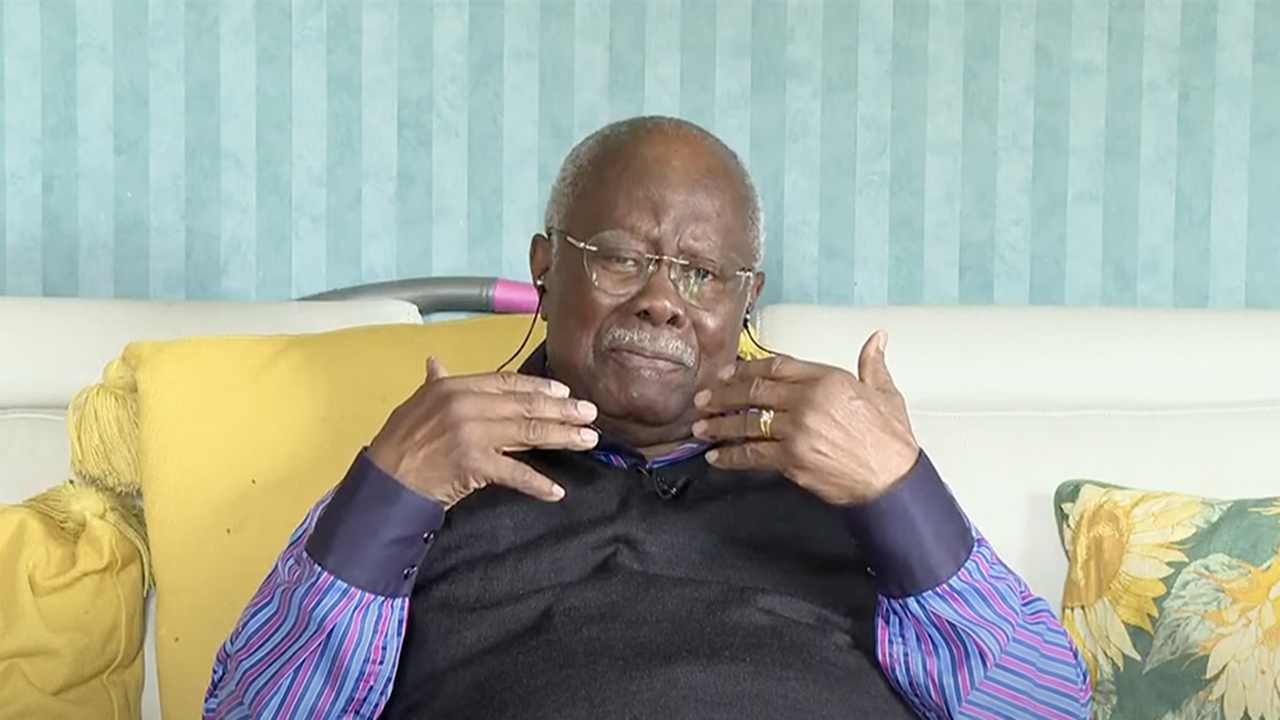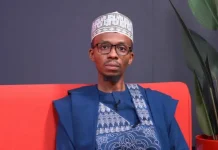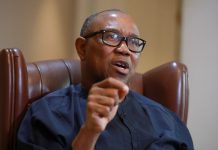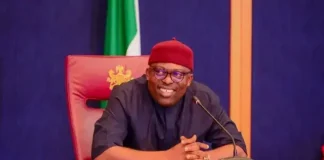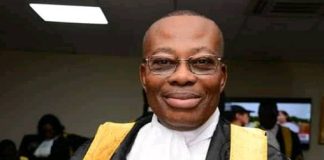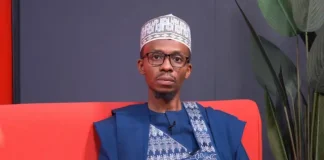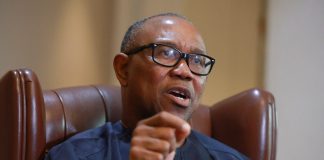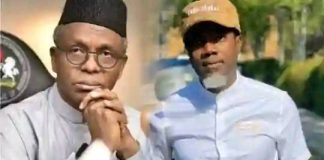🌿 Ruzu Non-Alcoholic Herbal Bitters
Ruzu Non-Alcoholic Herbal Bitters is a natural health supplement specially formulated to:
- ✅ Promote general wellness
- ✅ Detoxify the body
- ✅ Support the treatment of various ailments
Made from a powerful blend of 100% organic and medicinal herbs, Ruzu is completely alcohol-free, making it ideal for:
- 👪 All age groups
- 🌱 Health-conscious individuals
- 🌿 Anyone seeking non-alcoholic herbal remedies
Whether you're looking to boost your vitality, cleanse your system, or support healing the natural way, Ruzu Bitters offers a trusted herbal solution.
The Atona Oodua of the Source is Chief Olabode Ibiyinka George. In this conversation with BOLA BADMUS and AKINROLABU AKINDURO, he discusses his 80-year earthly journey, his youth, his academic experiences, and the reasons he enlisted in the Nigerian military. He claims that celebrating his 80th birthday demands a period of gratitude. Snippets:
Today, sir, you become 80 years old. What can you say about your life’s path to date?
Our family home is where I grew up. I recall attending St. John Aroloya, a deeply ingrained Christian school, for the first time. After purchasing uniforms, my father positioned me in the center of his Raleigh bicycle. That neighborhood between Campus Square and Isale Gangan is where I grew up.
As a chorister, I was required to attend choir rehearsal every Tuesday and Thursday. On Sundays, I was only allowed to attend church. We would wait for Catholicism to teach us the fundamentals while attending an early morning service.
I made a lot of pals in every category. That part of Lagos was both impressive and disturbing. Boys who have begun to exhibit what is known as “youthful rascality” tend to be extremely obstinate. Some didn’t even make an effort to attend school.
Though I was very fun, I did enjoy my childhood. Because I was aware of the repercussions for misbehaving, I acted like a proper Lagosian and someone from a Christian background. I continued to play football at Onala despite this, though. I soon gained a lot of recognition in our community. However, I didn’t solely focus on academics in elementary school.
My father once told me, “Look, I think the best thing for you is to go and learn a trade,” because I was always promoted on trial at the end of the year. Promotion on trial, according to my father, meant that I would have to sit with half of my butt in the next class. However, I managed to continue from Primary 1 to Primary 2 since, in Lagos at the time, primary education lasted eight years instead of the six that Chief Obafemi Awolowo began. After completing eight years of Primary 1, Primary 2, Standard 1, Standard 2, Standard 3, Standard 4, Standard 5, and Standard 6, you had to take secondary school entrance tests.
In the meantime, one of our tenants persuaded my father that I ought to enroll in a boarding school. Mr. Ogunsanya is his name, and I will never be able to forget him because he completely changed my life when I entered secondary school.
You know, there were rules in secondary schools back then. There was time for everything, including getting up, eating, and attending lectures. We were regulated, and I believe that had a very positive effect on me. I will always remember Mr. Ogunsanya and his spouse for suggesting to my father that I take the Ijebu-Ode Grammar School entrance exam. I had never left Lagos before that point.
Ijebu-Ode was the first secondary school in Ijebuland, so I went there to take the test. As a joke, I started and placed 10th out of 30 on the first term exam. This grade made me very delighted, and my father was also thrilled to see the progress, as I always did well in football. We have a front walk and a rear path because of the way our family home was constructed. Even though I was the captain of my team, I had to go to the rear to play football since my father was constantly at the window after work and you couldn’t screw around when he was at home. Then, our community’s elders organized a competition between different clubs that they independently designed and oversaw. I was the captain of our squad, which was called “7 Brights For 7 Brothers.” One of my teammates, Tunde Disu, was from Yaba, Ebute Metta. I continued to try to take my team’s jerseys and boots home to wash them in spite of my father’s strictness until we reached the final, which was scheduled for Sunday.
Because the final was on a Sunday, I told my team management to disregard me. I informed him that I had to go church, so I would not be able to make it. Since I was the team captain, the team manager stated that it was not feasible. In order to inform my father about the football competition, the team manager visited him behind my back. My father contacted me when I returned from the session to let me know that someone was there, and he gave me his name. When he said the name of our team manager, I was taken aback. My dad warned me not to be surprised. He claimed to have already been to my room and seen boots and jerseys. Lying was therefore unnecessary. I then told my father that I was, in fact, the captain of my team, “7 Brights for 7 Brothers.” I was shocked that my father did not beat me up for my admission. Instead, he allowed me to play in the championship game. He was even named the day’s chairman. Regretfully, we were defeated. My father became aware of my intense football enthusiasm at that point. I was introduced to Ijebu-Ode Grammar School by Mr. Ogunsanya, our tenant, who made the suggestion while we were conversing one evening. You understand that no one can alter what God has in store for you.
I was therefore already at the top of the class by the conclusion of the first term in Form 1. This was a huge advancement. I proudly returned home, and when my father saw me, he was taken aback by my rapid progress. The intervention was from God. We were regimented in secondary school, which was one of the things that inspired me to enlist in the military. We were expected to abide by those rules, and if we did not, the house masters or seniors would penalize us right away. There were times for everything we did in school back then, so perhaps that helped me settle. Study time, playtime, morning devotions, and more were all available. The system was regulated. When I went home from Form 1, my father was overjoyed with my academic achievement.
For the most part, I continued to attend Form 2. I joined the football first eleven when I reached Form 2. Even though I didn’t appear like much at the time, I was accepted for the school squad. We had excellent professors, some of whom were British, and I had many of friends and classmates. Mr. V. W. Ferris taught us mathematics, and I will never forget him. He simplified arithmetic to the level of ABC. I was performing exceptionally well in every other subject. Despite being in the top spot from the first year until I reached Form 5, I continued to play a lot of football. I participated actively in the school’s debate and quiz society.
Competitions was place between our schools and other schools, including the Government College in Ibadan. Education in the Western Region was unparalleled at the time. This country will always remember Baba Awolowo, who accomplished a great deal for the people. You can see how long ago he died, but because he was a gift from God, people still talk about him. Everyone benefitted from his policies. I’ve read a lot about him, even though I’ve never met him personally.
What does it mean to you to be 80 years old?
In retrospect, I can say that I have visited both the country’s highest and lowest mountains. In other words, I had sat in the president’s room at the Villa with him. What room possibly be superior to that? But at the same time, I was in the worst bedroom I’ve ever been in—a prison. I’ve seen everything, then. As a result, the purpose of my 80th birthday is to give thanks to the Almighty God for His grace, which enabled me to overcome my adversity and emerge victorious. I never in my life imagined that I would become a famous politician or governor. But it was made by God. Throughout my life’s journey, I had met a lot of people. I had encountered the ugly, the horrible, and the good. You see, you have to be afraid of God if you want to be in politics. Based on their ranks, it is simple to anticipate who will be in the military and what problems they will face. It’s another question entirely whether they are currently successful in the mission. They will be punished immediately if they don’t complete the assignment. Therefore, we are taught to manage resources based on capacity in the military. However, in civic life, you have to manage individuals from the lowest level of behavior to the highest. Thus, you must use caution at all times. Even though nobody is flawless, you need to be able to recognize wrongdoing and take appropriate action. No one, regardless of their great standing, would be buried with riches if they passed away, therefore you must resist giving in to flashy or profane lifestyles. We entered the earth naked as humans, and we will continue to do so. There would be a limit to how we are all rushing to obtain worldly materials if we could keep this thought in the back of our minds.
Even with our money, life is vanity. Everything on Earth is a complete waste. We have two groups of people in politics. We have decent politicians that think that people’s resources should be used wisely for the benefit of the populace. On the other hand, there are also some who pretend to be politicians and take advantage of people’s resources for their own gain. As a military officer and politician, I believe that I have done my best for the nation and humanity as a whole since these are the folks I refer to as “Politrickcians.” I’m in my life’s departure lounge right now. Anybody can be called by God at any time. Because of this, we have to make sure that whatever we do serves both God and the people. As I mentioned earlier, I visited the Presidential Villa in Aso Rock, which is the best and highest location in Nigeria. However, there came a time when several people deliberately banded together to put me in the worst possible situation. That’s jail. I’ve had many hardships, but God has supported me and given me triumph despite all of life’s ups and downs.
I have every reason to give thanks to God at eighty. You know, if God wants to utilize you, He can transport you to a spiritual desert where you will experience many hardships in order to prepare you for the task He has in store for you. You will succeed if you can maintain a strong sense of faith, and God has done just that for me. I have every right to give thanks to God. I give Him praise for my health. I do not use a wheelchair. My hands, legs, eyes, and brain are all working properly. My children are all doing great. He also gave me a wonderful wife who supported me through all of my difficult times. She is actually in charge of organizing every birthday celebration. For this, I thank God.
How did you find your time at university? What childhood practical jokes did you pull that you will always remember?
The university’s days were lovely, and because we were young and full of energy, we pulled many practical jokes. I earned my engineering degree from the University of Lagos. Before taking our final exams, all eight of the students in my graduating class found jobs. That was how stunning this country was back then. Kanji from the Niger Dam Authority (NDA) came to enlist us. Three of us from the same class were invited to visit Kanji. You are aware that World Bank monies were used to construct Kanji Dam. The Electricity Corporation of Nigeria, or ECN, was their sole customer, and their investment returns were insufficient. In the accounting book, they were constantly in the red.
Kanji, on the other hand, only had one client, ECN. The nation was profiting from the NDA. With 20 engineers and numerous skilled technicians, we managed the business effectively. I had technical training there for two years. Back then, you had to complete two years of student training to combine your theoretical knowledge with practical experience in order to become a competent engineer. I became close to my friend, Engr. Foluseke Somolu, whose father was the Western Region’s Chief Judge at the time. At university, we were in the same class. Together, we traveled to Kanji, where we stayed for two years. Prior to that, however, the grammar school’s top students were always sent to Brentwood’s school in England for an exchange program.
I therefore made an effort to apply for admission to a university after graduating from Ijebu-Ode Grammar School. Ibadan’s International School was only intending to begin a higher education program. Thus, I chose to enroll in the school. I simply went for the interview without telling anyone. My performance was very well received by the American who conducted the interview. When he brought up the school costs after the interview, I informed him that my father would not be able to pay for them. I was told to wait a minute by him. After leaving, he went to the headmaster and asked him to accept me on a partial scholarship. He claimed that the headmaster had agreed to offer me half of a scholarship when we returned to the room where he had interviewed me. He inquired as to whether the half scholarship arrangement would enable my parents to pay the expenses. Yes, that makes sense, I said. I thought I would start working with them in January, so I left the school. However, the school sent a letter of congratulations to my previous school, Ijebu-Ode Grammar School, stating that they had created a very good student with a promising future and that they had offered me a half scholarship to attend their school for my further education.
The next day, after receiving the letter, my principal at Ijebu-Ode Grammar School distributed the letters stating that my companion Sola and I were to begin our A-Level at Brentwood. When I came home, I gave my father a letter from the principal and an offer letter from International School (IS) stating that we would be flying to England to begin our A-Level by January 15.
After looking over the two proposals, my father asked me to choose which one I would choose. I mentioned to him that I had never considered traveling to England. We finally arrived in Brentwood to begin my A-Level. I joined the football squad as soon as I arrived at Brentwood. Since I was the only Black student at the school, all the white people in the neighborhood came to watch our games. As a result, I became well-known in Brentwood since I was the only Black football player, which made them think of the legendary Pelé.
I so had my first chance to visit the United Kingdom. My dad got me a new suit, I recall. I took a flight on Lufthansa Airlines with my schoolmate Sola. After first arriving in Frankfurt, we continued. I was wearing the Nigerian-made suit with Sola. We experienced extreme cold at the airport. Such a thing has never happened to me before. The jacket was unable to absorb the cold, so Sola and I were like frozen fish. But in the end, we arrived in London. At the airport, we were told to report to a location by mentioning our names. However, as we were unfamiliar with London, we were unsure of where to report. As a result, we had to ask for clarification at a counter. We were already at the Brentwood school. You know, that was another experience.
The size and infrastructure of the London airport differed from that of our own airport in Nigeria. They didn’t even need to make an announcement before your folks could see you because our airport was so small. As a result, we received excellent results on the A-Levels. We were awarded a scholarship to continue our studies at ABU. I had assumed that the scholarship would relieve my father’s financial burden.
However, my mother refused to go to ABU due to her fear of being killed during the civil war. Thus, we ultimately arrived at UNILAG. We received admission to UNILAG. One intriguing incident from UNILAG comes to mind. Because she was descended from the Aganga Williams family, the wife of the late Brigadier Mobolaji Johnson, the governor of Lagos, was my cousin.
We learned one day that the government of the Western region awarded scholarships to their kids. We enrolled in the university in 1967, and Lagos was established in July, May, or June of the same year. We therefore replied, “No, they should also start giving out scholarships in Lagos,” when we learned about the Western region government’s scholarship program. I then advised my friends to visit the governor’s office to discuss the matter with the governor. I offered to be their leader. They gave me a startled look and said that my boldness was intended to get them into trouble. But I reassured them that even if they detained us and my mother learned of it, the governor’s wife, who is my cousin,
would release us. After lunch, four of us left the school and went across Onikan Stadium to the Governor’s Office, which at the time was Tafawa Balewa’s office. The Governor’s Office was the final structure before the freeway. Four of us left after lunch. Four of us: Anibaba, Jabezi, Alex Oni, Kweisi, and me.
We succeeded. We explained that we were University of Lagos students and that we wanted to visit the governor when the protocol at the gates inquired what we were doing. When one of them pulled out their paper to see if our names were on the list of appointments, he chased us off when he discovered that they weren’t. However, a Yoruba man who was their supervisor stepped outside to listen to us. We showed him our ID cards and explained why we needed to see the governor. Then the man told us to hold off. In he went. Baba Yemi Bero was present as he entered. The Attorney General and Commissioner for Justice, Baba Bankole Oki, was present. It was Baba Domingo. He served as the Governor’s Chief of Protocols, and Justice Williams served as the Solicitor General. Years later, I met them.
After the man gave them our names, they asked him to let us in after realizing that we were native to the state. The governor had not yet arrived. They were downstairs, waiting for him. As a result, we entered and bowed down to the elderly men. I then stood up to speak on behalf of the four of us as the spokesperson. I explained to the elderly men that we were University of Lagos students and that we had recently learned that their children were receiving scholarships from the Western Region. I stated that we wanted the Lagos administration to treat its own children in the same way.
These elderly folks listened to me intently. Following my address, they advised us to be patient with them as we arrived at the end of the year, when their government was only six months old. They promised to consider our recommendation and take appropriate action. We profited from Lagos State’s establishment of a Scholarship Board around one month later, as promised. Thus, that was yet another governance experience. They didn’t chase us off. They must have made choices at their bigger meetings after listening to us.
What inspired you to enlist in the military?
the military problem. An advertisement appeared in the newspaper when we were almost done with our two-year pupilage program in Kainji. The war was just over, you know. Everyone was attempting to rearrange themselves, among other things. And it was lovely where we used to work at Kanji. We were self-aware. We got along well with our supervisors because we know them. There were barely twenty engineers in Kainji at the time. The Nigerian Dam Authority (NDA) and Electricity Corporation of Nigeria (ECN) were examined by the World Bank; the NDA was consistently in the red, while the ECN was
Always in the black. Thus, the World Bank suggested that the government combine NDA and ECN. Later on, that became NEPA. When this occurred, I thought that NDA, where I worked, would be consumed by the Electricity Corporation, a large organization. My conclusion was that. Fortunately, the Navy then made an effort to modernize through advertising. They were looking to hire experts. I recall telling my dad that I wanted to enlist in the military. My father said I shouldn’t enlist in the military and objected to it. However, I applied to the Navy, and after an interview, I was accepted. The Navy was glad to have young, talented engineers since they needed to replace their outdated manual systems with a more current, fully electronic system. They therefore required engineers capable of running and maintaining the new, cutting-edge armament system.
In order to join the Navy, I fled the merging of ECN and NDA in this manner. We completed the basic training and received our diploma. We performed well, and since naval engineering was different from outside engineering, we were sent to the Royal Naval Engineering College. Early warning radar, the real fighting radar, your weaponry, communication devices, and a host of other things were all things you had to understand. I therefore attended the Royal Naval Engineering College to get my maintenance skills refined. I was therefore permitted to learn. I’ll work in the Navy if I ever return since they gave me the opportunity to see the world. The Royal Naval Engineering College provided my training. I attended the School of Artillery, too. I spent more than a year in HMS Excellence, as they called it. In actuality, we are limited to military life and equipment.
What was your experience as a military administrator, and how did you learn that you had been appointed?
I recently returned from the Naval War College. I was therefore assigned to the Naval Headquarters as the Director of Weapons Systems Engineering. My rank was commodore. Thus, we participated in end-of-year drills with the Chief of Naval Staff. It was in December, or so. The ceremony was over, and our only plan was to return to Lagos by plane the next day from Port-Harcourt. My driver arrived when I was already in bed and informed me that I was one of the newly appointed cops after he heard my name on the radio broadcast.
as presidents. I couldn’t have imagined that, so I couldn’t understand what he was saying. I asked him to leave and switched on the radio in my room to listen to the news for the next hour. I was surprised to hear the news. I was sent to former Ondo State out of the three of us that were appointed. Other than traveling through Ore on my way to the East, I had never visited Ondo State. Like everyone else, I was astonished, but that’s just the nature of the military. They can make their own decisions without consulting you. You were required to do a non-regimental task. As a result, my home was packed with my friends and well-wishers by the time I arrived in Lagos. The government of Ondo State has already dispatched a vehicle to come get me. However, we had to travel to Abuja for a meeting after attending the swearing-in at the Dodan Barracks.
It was a top-level security conference. In the conference, I observed the other governors. Everything went smoothly as we interacted. We took a flight back to Lagos after the meeting. The people were waiting for me when I arrived in Lagos, so I asked the naval helicopter to drop me off at Akure so I could resume my duties. The departing governor was waiting. However, the Navy said that all of their helicopters experienced issues. I started to wonder how to travel to Akure at this time. However, I was saved by the Lagos etiquette, which I knew from UNILAG. We landed at Akure for the first time—something I had never imagined—after he rented a plane to drop us off there.
When I arrived in Akure, I was greeted by numerous traditional leaders. At the time, Ondo State was a hybrid of Ondo and Ekiti. You can only image the enormous number of monarchs that would have arrived to greet me. Everyone was in line. Colonel Opaleye, my predecessor, introduced me to them, and I welcomed them with deference appropriate to their position. I also met with the Secretary to the Government, who delivered me the handover notes. They took me to the Government House via car after that. Following this, as custom required, I paid him a courtesy call at the Palace of Deji of Akure for the first time. Akure has historically been his town. Therefore, you would have to respect traditional rulers like a well-bred Yoruba man. I went to the monarch and informed him that I was his son assigned to lead the state. I offered him my hand in fellowship and encouraged him to call me at any time if he had any suggestions for what I should do. I assured him that I will contact him.
We returned to the office from there. The sight of the Governor’s Office left me speechless. Since I’m not tall, I had to stoop to enter the office because it was so little. That is not comparable to Ibadan or Lagos, where I was coming from. Therefore, the rural form was still well defined, just as it was during my stay in Ondo. I made a comment at work, and by the second day, it had gained significant attention. It had become a headline in the media. I had a CPS, Henry Teniola. I was cited exactly by the press. This reached General Babangida, the Head of State, who contacted me and challenged me to make sure I constructed a suitable Governor’s Office based on what I had said about it. He informed me that he would be visiting Ondo State to check if I could meet the challenge. And we did not let you down, to God’s honor.

